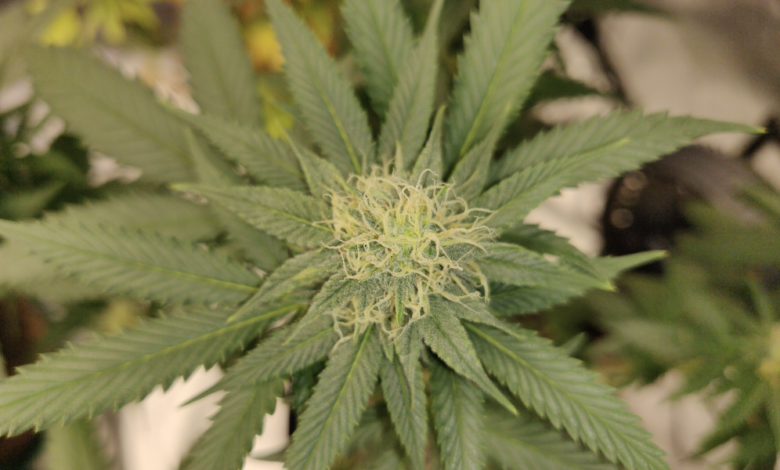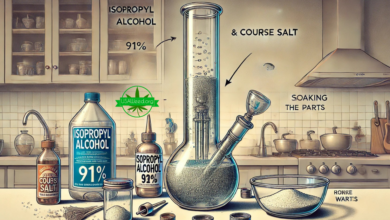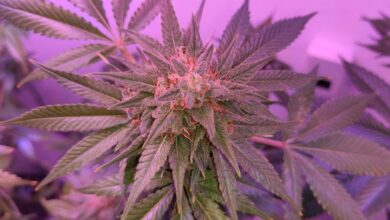Medical Marijuana Helps Mothers Be ‘More Present Parents’ And Develop ‘Positive Relationships With Their Children,’ Study Finds

Newly funded analysis from New Zealand reveals that moms who had entry to medical marijuana, reported that hashish improved their high quality of upbringing by capable of handle the well being situation extra successfully and tolerate the stress of care for kids.
On the identical time, individuals within the research of persistent obstacles, such because the excessive prices of authorized merchandise and continuously stigma and authorized dangers.
The brand new report, printed this week within the Journal Drug And Alcohol Evaluation, took off interviews with 15 moms who used medicinal hashish (MC) obtained by means of recipes, the unlawful market or each up to now yr. They have been requested about use usually, their conversations with youngsters, social stigma and dangers.
“Moms reported MC as an vital facilitator of their potential to boost their youngsters positively,” discovered the research, “in order that they’ll handle their very own well being wants (ie worry, endometriosis and arthritis).”
Moms additionally reported that “managing their well being with MC allowed them to be extra current mother and father and higher tolerate the stressors of motherhood,” wrote authors at Massey College in Auckland.
The moms have been recruited for the survey of a bigger group of 38 individuals who have been half of a bigger mission on the connection between ladies with medical marijuana. They have been interviewed one-on-one, both personally or through a web based video name.
“Individuals felt that having the ability to cope with their bodily ache and psychological want with [medical cannabis] meant that they have been in a greater temper and have been extra current. “
Nearly half of the moms who participated (46.6 p.c) mentioned they primarily smoked marijuana, whereas smaller proportions reported with the assistance of meals (40 p.c), oils (26.6 p.c), evaporation (20 p.c), tea (tea (tea (tea (tea (tea (tea (tea (20 p.c), tea (tea (tea (20 p.c) ( 6.7 p.c) and topicals (6.7 p.c).
Most obtained marijuana through the non -regulated, unlawful market (53.3 p.c), whereas a 3rd of the individuals (33.3 p.c) reported entry to each recipe and unlawful merchandise. Solely two moms (13.3 p.c) mentioned they used solely prescribed merchandise.
As a parenting instrument, the survey confirmed: “MC consumed MC to alleviate their bodily well being signs reminiscent of spasms, ache and crams. With out the distraction of ache, they believed that they might be extra current for his or her youngsters and will meet their wants. “
“Likewise, moms with psychological well being and temper situations reminiscent of anxiousness, melancholy, post-traumatic stress dysfunction and pre-menstrual dysfunction discovered dysforical dysfunction MC discovered MC calmer, extra relaxed and fewer overwhelmed,” says the report, “who in flip helped them Capacity to speak and make higher contact with their youngsters ”
“Individuals in our research thought so [medical cannabis] is a great tool to handle the stressors of motherhood and to facilitate constructive relationships with their youngsters. “
A couple of mentioned hashish usually “their total functioning and” potential to contain meaningfully “improved”
“Consequently, they expressed that their youngsters acquired higher parenting,” found the research, “that’s, extra” pleased, humorous “and” empathetic, “as an alternative of being” grumpy ” [and] vulnerable to ‘perceive’ to them. “
The respondents mentioned that overwhelming mentioned they averted consumption round their youngsters, generally even for using medical marijuana use for lengthy intervals.
“Regardless of a robust advocacy for MC use throughout parenting, all individuals emphasised a accountable consumption, which is submitted when reserving MC use for the night or evening after finishing their parental duties or when their youngsters go to mattress had gone, “authors wrote.
As a participant defined: “I would depart it till the night, so I had no duties to carry out, or I did not have to fret that I used to be current for the kids. It made me suppose:” Ben I rob my youngsters from High quality Time with me? ” “
Moms who have been single, had low incomes or had a incapacity, reported troublesome to pay for medical marijuana and due to this fact usually purchased it from non-regulated sources or grew their very own.
“It’s the very last thing on the price range, as a result of as a mom you might be at all times the final with the price range,” they mentioned. “The issues that youngsters want within the first place. It’s clear that it’s [illegal cannabis] Not as costly because the recipe, however it’s nonetheless fairly costly. “
One other solely reported to have the ability to afford medical marijuana as soon as within the final eight months’.
Concerning a dialog with their youngsters, the moms ‘promoted the standardization of MC use of their youngsters in 3 ways,’ says the research.
First they described it as a medication in the identical class as different medicines. Secondly, they emphasised that though society can view hashish customers negatively, the drugs supplied them therapeutic advantages. And third, “some moms have framed MC as a pure product with therapeutic properties.”
“All moms discovered hiding their MC consumption would contribute to the stigma and go away room for kids to make the improper assumptions, or miscommunication to others,” says the report.
Individuals with younger youngsters “have been enthusiastic concerning the prospect of discussing MC with them sooner or later,” provides it, though others “have been extra apprehensive about having to make this dialog as a result of they thought the data may overwhelm their youngsters , or that it was not essential to make extra identified than MC is a medication.
“We’ll simply be very open to her that there’s stigma and that comes from historic causes and from social values,” mentioned a mom, “however our household values don’t match these social values … and these are the the reason why we’re have made the alternatives now we have and now we have trusted. “
Other than social stigma that moms mentioned they thought, the individuals additionally acknowledged the authorized dangers to make use of medical marijuana – dangers that many acknowledged diversified per breed.
“A number of NZ European moms thought that their white race was a privilege that would shield them towards laborious remedy or crime if they’re caught by the police with non-recipe MC,” the report says. “That is in distinction to rhetoric of a Māori mom who felt the excessive prices of prescribed MC prevented Māori from having legally entry to merchandise, which meant that they have been pressured to unlawful entry routes.”
A mom defined: “White privilege is available in right here within the sense that I believe it could be unlikely that I might get jail. In the event that they suppose it could be my possession, there’s a little bit of the concept due to my ethnicity and my properly -trained vocabulary, I believe, conviction could be unlikely. “
Those that weren’t married, in the meantime, “expressed their concern that their identification as single moms who use MC run the chance of getting their youngsters legally faraway from their care,” says the research. “Three moms who have been both divorced from the fathers of their youngsters or negotiations feared that their MC use could be armed towards them and used it as a motive to recommend that they have been irresponsible mother and father. This had served as a motivation for 2 of the moms to modify from the non -regulated market to a statutory recipe up to now 12 months. “
Particularly, the small pattern measurement and restricted demographic illustration meant that the findings didn’t “characterize the views of all moms from totally different ethnic teams, youthful age cohorts and social backgrounds of identities with the assistance of MC,” authors acknowledged.
Nonetheless, the findings “illustrate the worldwide legalization of MC as a attainable catalyst for shifting attitudes in relation to hashish use in parenthood, and a pattern of ladies who train company of their well being utilizing complementary different therapies”, the report concludes. “Additionally they emphasize the significance of creating pointers that assist discussions with care suppliers about MC and coverage that tackles obstacles for moms who need entry to authorized MC merchandise.”
The tales of the ladies ‘additionally mirrored an inside battle between desirous to empower by utilizing MC and talk about it with their youngsters, however then eat it after their youngsters went to sleep to not expose them,’ authors added .
The findings from New Zealand contribute to a rising variety of analysis on marijuana and parenting.
Final yr, for instance, a research by the federally funded research by authors of the College of Tennessee, Ohio State College and San Jose State College, found that though most mother and father mentioned they didn’t eat marijuana whereas their youngsters have been current, those that used hashish, On the whole, constructive parental habits reported in the identical timeframe that they consumed the drugs.
On the whole, the findings reveal “an advanced relationship between hashish use and parenthood between a pattern of hashish customers”, authors of that research wrote. However the outcomes nonetheless supplied “some details about methods during which mother and father may cause harm to assist constructive parenting.”
Final yr, a separate research additionally confirmed that entry to medical marijuana can enhance the quantity of upbringing that individuals enter into by bettering sufferers’ well being.
“Our outcomes recommend that [medical marijuana legalization] Can have a major constructive impact on the event of youngsters by means of an elevated parenting time, “concluded that analysis,” particularly for these youthful than 6 years, a interval that’s characterised by a extremely lengthy -term return in direction of parental investments. “
The most important reservation in these findings famous, researchers famous, that the advantages solely apply if mother and father don’t abuse hashish, and a larger enhance in parenting time “for many who are much less inclined to abuse Marihuana.”
Though restricted analysis has been completed into the position of the marijuana coverage on parenting habits, a 2023 research confirmed that states noticed that legalized medical marijuana noticed a lower of virtually 20 p.c within the recordings of foster care primarily based on abuse of parental medicine. Legalization Earlier than utilizing adults, it was not related to a statistically vital change in foster care establishments.
Nonetheless, separate analysis from 2022 has recognized a significant relationship between legalization for adults and abuse of foster care. In that research, researchers from the College of Mississippi found that leisure legalization was on common related to at the least 10 p.c lower in foster care, together with reductions of placements on account of bodily abuse, neglect, parental detention and abuse of alcohol and different medicine.
Photograph because of Mike Latimer.




